Meet Heather Young Author Of The Lost Girls
A missing girl. A broken family. A house haunted by sorrows. Heather Young's debut The Lost Girls was an award-winner in the US, where she lives, and is now thrilling UK readers. Thriller Women asked young why she loves writing about small town America, how she changed careers for law to writing and her top writing tips. Plus read on for a glimpse into her much-coveted library!
Download the ebook of The Lost Girls from Amazon or buy the paperback from Thriller Women's list at Bookshop.org. NB: if you buy books through this link we may earn a commission from bookshop.org, whose fees support independent bookshops. The Lost Girls is published by Verve Books.
TW: Welcome Heather, please tell us about your journey to becoming a novelist. When did you realise that you wanted to give up litigation to write full time, and what inspired you to write your debut The Lost Girls?
HY: I didn’t go straight from litigation to literature; I spent about ten years as an at-home mom first. When my kids were in their middle grades I finally had enough time on my hands to think about a second career, and, kind of on a whim, I decided to give writing a try. Honestly, I thought it would be easy – I’m an avid reader, and as a lawyer I knew my way around a sentence – but it was shockingly, humblingly difficult. It took me eight years to learn how to write fiction and finish my first book, and it’s by far hardest, and most rewarding, thing I have ever done.
TW: The Lost Girls won the Strand Award for Best First Novel and was nominated for an Edgar Award in the US, which must have been a very proud moment, and your second novel The Distant Dead has also been nominated for the 2021 Edgar Award for Best Novel in the US (and will be published in the UK in paperback in Spring 2022 and is available now in eBook). What was the most challenging part of writing your second novel?
HY: The Distant Dead was more complicated in its plot than The Lost Girls, and this, combined with the fact that I was working on a deadline instead of meandering my way through a manuscript with no one looking over my shoulder, made the process much more stressful. I had nightmares that, in my haste to finish the book, I was botching the careful narrative work that goes into crafting a satisfying mystery. I breathed a huge sigh of relief when my editor read it and only wanted me to add a couple more red herrings instead of asking how in the heck anyone could actually believe any of the words I’d written.
3. Your work could be pitched as Jodi Piccoult meets Jane Harper. How would you pitch your own work and which writers have inspired you professionally?
HY: That is a very flattering comparison to two of my favourite authors! I am terrible at pitching my own work, but I draw inspiration from mystery writers who lavish attention on character, like Kate Atkinson and Tana French, and writers like Marilynne Robinson and Kazuo Ishiguro who render deep, complex emotions with tender, understated language.
TW: Like many authors, your books have been published during a worldwide pandemic. How has this affected you both personally and professionally?
HY: Publishing during the pandemic was no fun, to be honest. Not only was I unable to hold live events at bookstores, but the bookstores themselves were closed to the browsers that a book like mine depends on to find an audience. Trying to write my next book was challenging, too, with my husband and son unexpectedly home all the time. But these were difficult times for everyone, and the struggles I faced as a writer pale in comparison to the hardships so many faced, from missed celebrations like graduations and weddings to severe financial distress and, for far too many, death.
TW: What interests you particularly about small town America?
HY: I think any small town is a crucible for human relationships and emotions. The intimacy people share when they have known everyone around them for as long as they can remember, and when their parents and grandparents have known one another just as closely, is dramatic stuff. Lost loves, grudges, missed opportunities, secrets….they’re in the air people in a small town breathe. There’s a reason the police always look first at a victim’s family when they’re investigating a murder: the people we know best often have the most profound, personal, and powerful reasons to want us dead. A small town is just a few degrees broader than a family.
TW: Tell us about your daily writing routine.
HY: I devote my mornings to exercise, errand-running, and chores (emptying the dishwasher – ugh). Once I’ve cleared my to-do list, my mind is open to the creative process of writing. I spend anywhere from three to five hours working, Mondays through Fridays. Of course, sometimes what I call “working” is really research, or book promotion, or banging my head against the wall in frustration, but it all falls under the heading of work, so it all counts.
TW: What are you working on next?
HY: My next novel is set in a small town in Iowa during the Second World War. Like my other two books, it’s something of a coming of age story, as a young girl confronts prejudice and the dark side of patriotism as a member of an 'outsider' family. Throw in the murders of several young Mexican orphans and her brother’s secret life and I hope I end up with something that offers a slightly different perspective on World War II than those of the many excellent novels I’ve read that examine this era.
TW: Can you share with us the best piece of advice you’ve been given on the art of writing fiction?
HY: There are two, actually. The first is about the art of simplicity in prose. My tendency is to dial my prose up to eleven, with elaborate metaphors and florid descriptive passages. An early writing teacher told me to place my trust in quiet language, and in the power of simple, ancient words. Words like death, love, hope, trust, hate, and fear are among the earliest and most primitive in the English language, and because they are rooted so deeply in our ancestral consciousness they never lose their power.
The second is to tell your story in the spaces between the words. That’s really just a fancy way of saying 'show don’t tell', but somehow the notion that there’s an unspoken world in the white spaces on the page and that my job is to let it breathe helps me step back and allow my reader to make intuitive leaps, particularly emotional ones.
TW: Are you a plotter? How do you go about planning your stories?
HY: I am a pantser through and through. I start with a setting, some characters, an inciting event (the crime), and a vague idea of who did it and why. Then I start writing, feeling my way as the characters deepen and strike sparks off of one another. I revise as I go, spending roughly as much time revising previously written pages as I do writing new pages, so my first draft is really my only draft. Which isn’t to say there isn’t substantial revision once that draft is done, but those revisions are mostly about pacing, character, clues/red herrings, and adding or deleting individual scenes rather than on wordsmithing or rebuilding the framework of the plot itself.
Quick fire questions:
TW: Your favourite place to read?
HY: The library that my father built for me in our house – it’s ornate yet cozy and it’s inspiring to be surrounded by books I love.
TW: Are you a plotter? How do you go about planning your stories?
HY: I am a pantser through and through. I start with a setting, some characters, an inciting event (the crime), and a vague idea of who did it and why. Then I start writing, feeling my way as the characters deepen and strike sparks off of one another. I revise as I go, spending roughly as much time revising previously written pages as I do writing new pages, so my first draft is really my only draft. Which isn’t to say there isn’t substantial revision once that draft is done, but those revisions are mostly about pacing, character, clues/red herrings, and adding or deleting individual scenes rather than on wordsmithing or rebuilding the framework of the plot itself.
Quick fire questions:
TW: Your favourite place to read?
HY: The library that my father built for me in our house – it’s ornate yet cozy and it’s inspiring to be surrounded by books I love.
TW: Your favourite classic novel?
HY: Great Expectations by Charles Dickens.
HY: Great Expectations by Charles Dickens.
TW: Best book that you read during the pandemic?
HY: Station Eleven by Emily St. John Mandel. Yes, it’s about a global pandemic, but it’s beautifully written and shot through with hope.
HY: Station Eleven by Emily St. John Mandel. Yes, it’s about a global pandemic, but it’s beautifully written and shot through with hope.
TW: A book you should have read by now, but haven't?
HY: Ulysses by James Joyce. I probably won’t ever read it, either.
HY: Ulysses by James Joyce. I probably won’t ever read it, either.
TW: Favourite TV/film adaptation?
HY: The BBC’s sumptuous 1995 Pride and Prejudice television series. Colin Firth was the perfect screen embodiment of Mr Darcy and I will fight anyone who says different.
Thanks Heather!
Sixty years later, Lucy, the quiet and watchful middle sister, lives in the lake house alone. Before her death, she writes the story of that devastating summer in a notebook that she leaves, along with the house, to the only person who might care: her grandniece, Justine.
Soon Justine's troubled oldest daughter becomes obsessed with Emily's disappearance, her absent mother reappears, and the man she left launches a dangerous plan to get her back. In a house haunted by the sorrows of the women who came before her, Justine must overcome their tragic legacy if she hopes to save herself and her children.
HY: The BBC’s sumptuous 1995 Pride and Prejudice television series. Colin Firth was the perfect screen embodiment of Mr Darcy and I will fight anyone who says different.
Thanks Heather!
More about The Lost Girls:
In 1935, six-year-old Emily Evans vanishes from her family's summer house on a remote Minnesota lake. Her disappearance destroys the family - her father takes his own life, and her mother and two older sisters spend the rest of their lives at the lake house, keeping a decades-long vigil for the lost child.Sixty years later, Lucy, the quiet and watchful middle sister, lives in the lake house alone. Before her death, she writes the story of that devastating summer in a notebook that she leaves, along with the house, to the only person who might care: her grandniece, Justine.
For Justine, the lake house offers freedom and stability - a way to escape her manipulative boyfriend and give her daughters the home she never had. But the long Minnesota winter is just beginning. The house is cold and dilapidated. The dark, silent lake is isolated and eerie. Her only neighbour is a strange old man who seems to know more about the summer of 1935 than he's telling.
Soon Justine's troubled oldest daughter becomes obsessed with Emily's disappearance, her absent mother reappears, and the man she left launches a dangerous plan to get her back. In a house haunted by the sorrows of the women who came before her, Justine must overcome their tragic legacy if she hopes to save herself and her children.
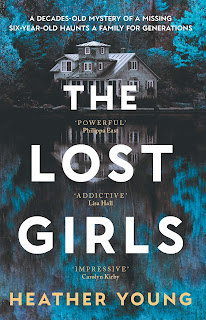
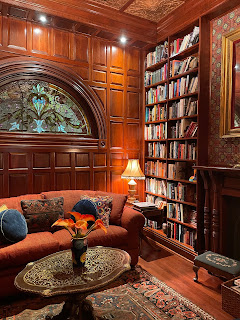
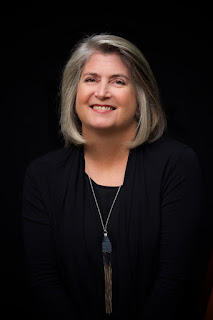
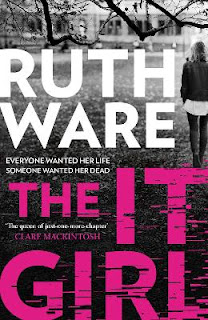
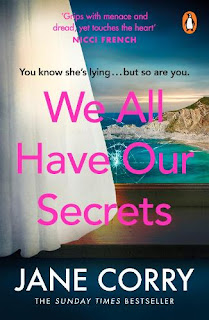
Comments
Post a Comment